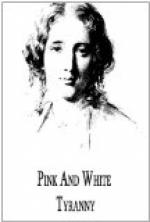People may mourn in lugubrious phrase about the Irish blood in our country. For our own part, we think the rich, tender, motherly nature of the Irish girl an element a thousand times more hopeful in our population than the faded, washed-out indifferentism of fashionable women, who have danced and flirted away all their womanly attributes, till there is neither warmth nor richness nor maternal fulness left in them,—mere paper-dolls, without milk in their bosoms or blood in their veins. Give us rich, tender, warm-hearted Bridgets and Kathleens, whose instincts teach them the real poetry of motherhood; who can love unto death, and bear trials and pains cheerfully for the joy that is set before them. We are not afraid for the republican citizens that such mothers will bear to us. They are the ones that will come to high places in our land, and that will possess the earth by right of the strongest.
Motherhood, to the woman who has lived only to be petted, and to be herself the centre of all things, is a virtual dethronement. Something weaker, fairer, more delicate than herself comes,—something for her to serve and to care for more than herself.
It would sometimes seem as if motherhood were a lovely artifice of the great Father, to wean the heart from selfishness by a peaceful and gradual process. The babe is self in another form. It is so interwoven and identified with the mother’s life, that she passes by almost insensible gradations from herself to it; and day by day the distinctive love of self wanes as the child-love waxes, filling the heart with a thousand new springs of tenderness.
But that this benignant transformation of nature may be perfected, it must be wrought out in Nature’s own way. Any artificial arrangement that takes the child away from the mother interrupts that wonderful system of contrivances whereby the mother’s nature and being shade off into that of the child, and her heart enlarges to a new and heavenly power of loving.
When Lillie was sufficiently recovered to be fond of any thing, she found in her lovely baby only a new toy,—a source of pride and pleasure, and a charming occasion for the display of new devices of millinery. But she found Newport indispensable that summer to the re-establishment of her strength. “And really,” she said, “the baby would be so much better off quietly at home with mamma and Kathleen. The fact is,” she said, “she quite disregards me. She cries after Kathleen if I take her; so that it’s quite provoking.”
And so Lillie, free and unencumbered, had her gay season at Newport with the Follingsbees, and the Simpkinses, and the Tompkinses, and all the rest of the nice people, who have nothing to do but enjoy themselves; and everybody flattered her by being incredulous that one so young and charming could possibly be a mother.
CHAPTER XXVII.
CHECKMATE.




